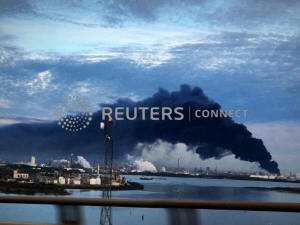Planned U.S. oil storage boom faces new scrutiny after
tank-farm fire
 Send a link to a friend
Send a link to a friend
 [March 23, 2019]
By Collin Eaton [March 23, 2019]
By Collin Eaton
HOUSTON (Reuters) - A three-day
petrochemical fire that spread a cancer-causing chemical and thick smoke
over Houston suburbs this week has spurred calls for tougher safety
regulations that could affect a nearly dozen crude-export terminals
proposed for the U.S. Gulf Coast.
Federal, state and local officials have begun investigating whether
Mitsui & Co's Intercontinental Terminals Co (ITC) met safety and
environmental regulations after the fire in Deer Park, Texas, spread
quickly among rows of giant tanks that hold up to 3.3 million gallons of
fuel each.
The blaze released toxic benzene which led five school systems with more
than 108,000 students to shut for two days, and prompted two cities to
tell residents to stay indoors.
It burned for three days and destroyed 11 tanks holding fuels used to
make gasoline and plastics that sat along the nation's busiest
petrochemical port and among nine oil refineries.

On Friday, a leak from a containment dike at the facility prompted new
travel restrictions in the immediate vicinity of the plant.
Results from those reviews could affect proposed terminals that would
add millions of barrels of oil storage capacity, to cater to a shale
boom that has made the United States the world's top oil producer with
more than 12 million barrels pumped each day.
There are already some 90 million barrels of oil storage capacity in
above-ground tanks near Houston, estimates data provider Genscape.
Harris County, which oversees the ITC tank farm, plans to review the
investigations and may propose changes to state regulations, said the
county's chief executive, Lina Hidalgo.
Environmental groups said the fire and lack of notice to residents
exposed Texas's weak oversight of energy and chemical storage sites.
"I would like to think there will be a huge push and elected officials
would do their due diligence," said Elena Craft, senior director for
climate and health at the Environmental Defense Fund. "We want
accountability," said Bryan Parras, a spokesman for environmental group
Sierra Club.

[to top of second column] |

Smoke rises from a fire burning at the Intercontinental Terminals
Company in Deer Park, east of Houston, Texas, U.S., March 18, 2019.
Jaimie Meldrum/@jamiejow/Handout via REUTERS

ITC, which had 242 storage tanks holding about 13 million barrels of fuels, is
not required to comply with county fire codes because it was built before the
county adopted codes in late 2014, said Rachel Moreno, a spokeswoman for the
county Fire Marshal.
ITC adheres to fire-prevention guidelines set by industry group the National
Fire Prevention Association and the American Petroleum Institute, said ITC
spokeswoman Alice Richardson. A temporary loss of water pressure on the first
day of the blaze contributed to its spread.
However, critics say the NFPA guidelines set minimum standards and the use of
advanced fire-protection systems could have more quickly extinguished the fire
before it spread and released millions of tons of carbon monoxide, and thousands
of pounds of nitrogen oxides, sulfur dioxide and other pollutants.
The fire prevention group expects the investigations into the ITC fire could
prompt changes to its guidelines, said Guy Colonna, NFPA's senior director of
engineering. Its existing recommendation for petrochemical tanks, called NFPA
30, does not require fixed fire suppressants, Colonna said.
State and local governments "need to amend the minimum requirements to hold
companies like ITC more accountable for building terminals in areas where the
severity of the fire is going to cause a bigger disaster," said Marcelo D'Amico,
a principal at Orcus Fire and Risk Inc, which designs fire-prevention systems
for tank farms.

New storage regulations would face opposition in Texas. A state lawmaker
recently filed a bill that would speed air-quality permit reviews for energy
projects before environmental regulator Texas Commission on Environment Quality,
one of the groups now investigating ITC.
Ryan Sitton, commissioner of Texas energy regulator, the Railroad Commission,
said more fire-suppression equipment on ITC tanks could have led to greater
releases of benzene, not less.
"The big fire was burning off the benzene," Sitton said. "If I start mandating
things to put out fires, it could run the risk" of releasing more chemicals into
the atmosphere.
(Reporting by Collin Eaton in Houston; Editing by Marguerita Choy)
[© 2019 Thomson Reuters. All rights
reserved.] Copyright 2019 Reuters. All rights reserved. This material may not be published,
broadcast, rewritten or redistributed.
Thompson Reuters is solely responsible for this content. |